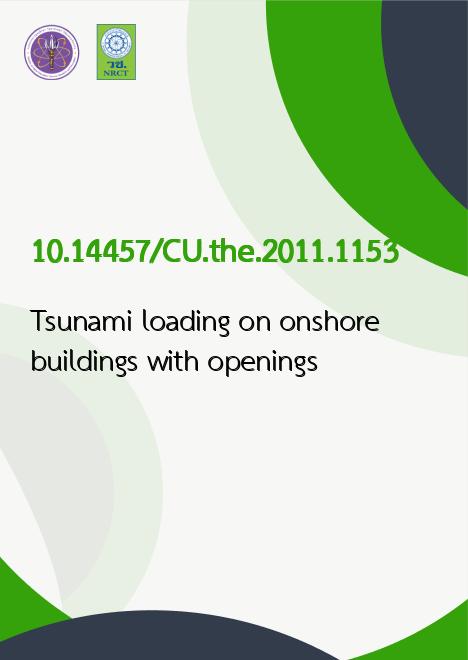
|
Tsunami loading on onshore buildings with openings |
|---|---|
| รหัสดีโอไอ | |
| Title | Tsunami loading on onshore buildings with openings |
| Creator | Nuttawut Thanasisathit |
| Contributor | Panitan Lukkunaprasit, Anat Ruangrassamee |
| Publisher | Chulalongkorn University |
| Publication Year | 2554 |
| Keyword | Tsunamis, Buildings, Tsunami damage, สึนามิ, อาคาร, ความเสียหายจากสึนามิ |
| Abstract | From the field survey of the damaged buildings in the 2004 Indian Ocean tsunami, a substantial number of multi-story reinforced concrete buildings were found to survive with minor structural damage, especially those with openings exhibited better performance than the ones with solid walls. Experiments were therefore carried out in a hydraulic wave flume to investigate tsunami force on models with different configurations of openings. Furthermore, FEMA P646 has been adapted to estimate the hydrodynamic forces on buildings with openings. One-to-one hundred-scale models of square, rectangular and octagonal shapes were tested in a wave flume. Three configurations of openings were investigated for the square models, viz., 0%, 25% and 50%. The models were subjected to solitary - like waves, which were generated by a sudden release of water from the water tank. The experimental results show that there is a reduction in the forces acting on the whole building in the order of 15% to 25% and 35% to 50% for the 25% and 50% opening configurations, respectively. Although the models have different opening configurations, the pressures on the front panel do not vary significantly across the width at the same level and they can be regarded as the same for practical purposes. Based on this observation, FEMA P646 which does not provide any recommendation for buildings with openings, has been adapted for estimating tsunami loading on buildings with openings. The FEMA P646 specified loading is computed and then modified by the effective area to gross area ratio. The adapted FEMA P646 loading is verified by comparison with the measured forces from experiments which include the simple models mentioned above, and a model of a damaged building in the 2004 event, which has a large open exposure. The proposed method provides, in general, a reasonable upper bound to the experimental results. |
| URL Website | cuir.car.chula.ac.th |